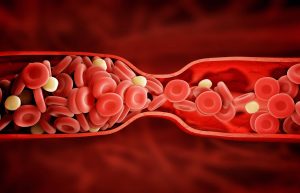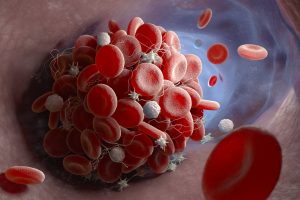COVID-19 brings many health problems and destroys your body. One of the complications of COVID-19 is the formation of blood clots. Scientists study the causes of blood clots after coronavirus infection, but they do not yet have a definite answer. Nevertheless, doctors and scientists note that people who have a severe form of infection have blood clotting disorders.

According to the results of recent studies, the coronavirus enters the cells of the walls of blood vessels, destroys them, causing inflammation. These processes lead to the formation of blood clots.
Also, COVID-19 triggers the release of large amounts of fibrinogen protein into the blood plasma. Although this protein works to reduce inflammation in injuries, excessive amounts of this protein lead to thickening of the blood, and the formation of blood clots.
Also, people suffering from a severe form of coronavirus are forced to lie for a very long time. Unfortunately, the lack of movement provokes blood stasis, which increases the risk of blood clots.
The danger of blood clots has been proven for a long time. They
are an obstacle to circulation and cause the development of fatal diseases.
If a blood clot enters a vessel that transfers blood to the heart, then
a person can get a heart attack. If a blood clot enters a vessel that carries blood to the brain, then the person gets a stroke. Also, a blood clot can enter the lungs and cause a deadly pulmonary embolism.
COVID-19 is an insidious disease that is difficult to cure with conventional medications. Until a vaccine is developed, doctors are trying to use every possible means to save the lives of their patients. Clinical guidelines for the treatment of coronavirus are changing because the virus mutates too fast. But, even if you are lucky enough to be cured, the consequences of a viral illness can destroy your health for some time.
Doctors around the world are trying to find ways to cure people about the coronavirus and are using drugs that are available in their country. Nevertheless, they are all sure that taking medications to thin the blood for all patients, without exception, to prevent the development of blood clots does not make sense and can harm recovery.
If the patient has problems with blood clotting, then taking anticoagulants to prevent thrombosis may hurt treatment. If the patient has too thick blood, then the appointment of such drugs is necessary, but only the doctor sets the dosage and regimen for taking such drugs. Taking these medications without control can cause complications and lead to breathing or heart problems.

Also, scientists argue that patients with a moderate and mild form of COVID-19 should not use anticoagulants or antiplatelet drugs. None of the studies have shown that these drugs help improve the condition of patients with mild and moderate COVID-19.
The World Health Organization has developed recommendations and identified a list of people who are at high risk of blood clots as a result of the COVID-19 viral infection. This list includes people:
- with limited ability to move;
- with cancer;
- with impaired blood clotting;
- suffering from thrombosis;
- over 70 years old;
- with heart or respiratory failure;
- with obesity;
- are undergoing hormonal therapy;
- use oral contraceptives.
COVID-19 has tremendous destructive power and can increase the risk of blood clots, but this is not a reason to take drugs to prevent blood clots such as anticoagulants without a doctor’s recommendation.
Comments are closed, but trackbacks and pingbacks are open.